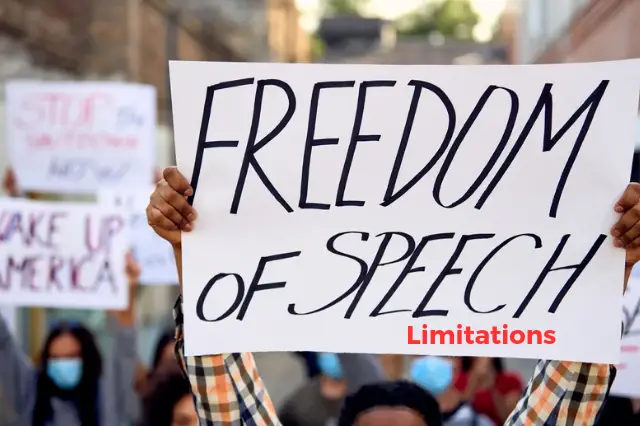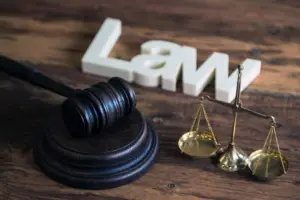In this article, you will find out some limitations to freedom of speech.

As citizens of a country, we are entitled to fundamental human rights [1] that protects us from being unfairly treated. These rights range from right to life, education, liberty, freedom of movement, peaceful assembly, freedom of speech and a host of others.
They are legally provided by law and cannot be ordinarily denied by any person or government.
However, it is important to understand that as much as we are entitled to these rights, it doesn’t mean that its access can not be limited. Oftentimes, some people feel they are free to do or say anything because they are entitled to certain rights without understanding that there is an extent to which these rights can be exercised.
A government, the police or public bodies can limit certain rights but with legal backing, else it is considered unlawful and a breach of fundamental rights. One of such rights include freedom of speech.
Freedom of speech [2] is a constitutional protection that gives individuals and communities the right to present their ideas and opinions without fear of being censored by the government. While this is good, there are also downsides to giving citizens the absolute right to express themselves. It could be used to encourage violence against other members of society, and spread potentially harmful misinformation. It can also be used by powerful individuals to intimidate and oppress others.
Therefore, freedom of expression can be limited in some cases. This is because freedom of expression is what is called a non-absolute or qualified right [5].
A right is non-absolute if there are some situations when the law allows the government to limit the enjoyment of the right inorder to protect others. In other words, with this understanding, this right can be limited for the following reasons:
1. Security of the Country
Persons holding public offices or members of the armed forces of a country are usually exposed to a lot of confidential information that shouldn’t get out to the public to avoid issues such as threat, rebellion, war, etc.
For such people, the government has the right to deny the freedom of speech and expression. The purpose is to prevent the disclosure of information received in confidence to protect the security of the country.
2. To maintain friendly relations with foreign states
Maintaining a positive relationship with more powerful neighboring countries is important for growth and development. Where a person’s freedom of speech threatens to hinder such a relationship, it can be limited. This purpose is to curb malicious actions that may jeopardize the reputation of the country.
3. Defamation

Defamation [4] is a criminal offense. Defamation law states that people cannot intentionally share lies about other people in a way which affects their reputation.
The right to freedom of speech is not a license to defame another person. If defamation is committed in the form of spoken or written words, freedom of speech can be infringed on by the government to protect the interest of other citizens.
4. Decency and Morality
Oftentimes, people tend to speak carelessly without considering what others think. This is common with social media users whose speech and expressions are vulgar. Speech must be decent and moral. It is important to know that standards of decency and morality evolve and change along with society and as such are not static. Hence, freedom of speech and expression can be limited to put decency and morality to check to protect the most vulnerable members of society.
5. Contempt of Court

Wikipedia [6] defines Contempt of court as the offense of being disobedient to or disrespectful toward a court of law and its officers in the form of behavior that opposes or defies the authority, justice, and dignity of the court.
To maintain value and preserve public trust in the law court, freedom of speech can be limited. The goal is to ensure that the courts are not vandalized.
Conclusion
Laws differ from one country to another. Hence, what may be an offense in one place may not be in another. Therefore the issue of limiting freedom of speech varies from one place and time to another.
Regardless, rights come with responsibilities, hence, it is the responsibility of the citizens of every country to make wise use of their rights in a way that does affect the country as a whole.
In a contemporary and democratic world, the right to freedom of speech is sacred for individual autonomy. However, it cannot be absolute. This means that the government or any organization has the right to limit or restrict some fundamental rights if its usage begins to cause havoc to the society. This can only be achieved with legal backings, else it can be considered a breach [2] of right. Hence, while you have the right to freedom of speech, bear in mind that certain situations can bring about its limitation.
References
[1] Adu, Dayo. “Fundamental Human Rights under the 1999 Constitution (as Amended).” Famsville Solicitors, 15 Aug. 2022, https://www.mondaq.com/nigeria/human-rights/1221232/fundamental-human-rights-under-the-1999-constitution-as-amended.
[2] “Can Freedom of Expression Be Limited?” Nigeria – Action4Justice, 29 Jan. 2021, https://nigeria.action4justice.org/legal_areas/right-to-freedom-of-expression-2/how-can-my-right-to-freedom-of-expression-be-breached/.
[3] “No Title.” Study.com, https://study.com/learn/lesson/freedom-of-speech-limitations-importance-examples.html. Accessed 31 Mar. 2023.
The Editors of Encyclopedia Britannica. “Defamation.” Encyclopedia Britannica, 22 Mar. 2023.
[4] The Editors of Encyclopedia Britannica. “Defamation.” Encyclopedia Britannica, 22 Mar. 2023.
[5] “What Are the Differences between Absolute and Qualified Rights in the Indian Constitution?” Quora, https://www.quora.com/What-are-the-differences-between-Absolute-and-Qualified-Rights-in-the-Indian-Constitution. Accessed 31 Mar. 2023.
[6] Wikipedia contributors. “Contempt of Court.” Wikipedia, The Free Encyclopedia, https://en.m.wikipedia.org/wiki/Contempt_of_court.
Don’t miss out on current updates, kindly like us on Facebook & follow us on Follow @Eafinder OR leave a comment below for further inquiries.







